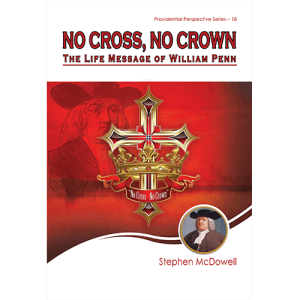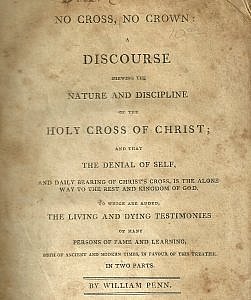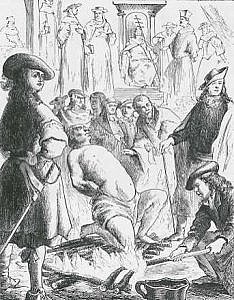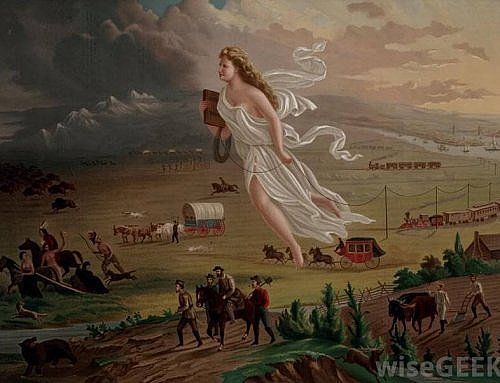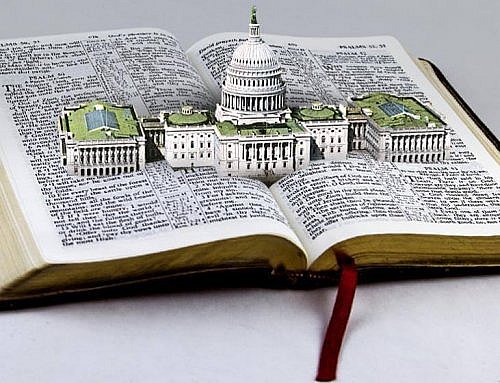by Stephen McDowell
In December 1668, William Penn was thrown in jail for expressing his religious views. While imprisoned for over eight months he wrote the book, No Cross, No Crown, in which he states that “Christ’s Cross is Christ’s way to Christ’s Crown.” Penn’s life is a great example of one who bore the cross and, therefore, did bear the crown. He brought the crown to millions more as well.
The Great Blessings or Crown of Christ
Christ has done many marvelous things for us. We should remember the great blessings He has brought to us personally: He has redeemed us and saved us; He has removed the burden of sin and guilt; He has healed our spirit, mind, and body; He makes us new creatures, transforming us; He refines us, washing us as white as snow; He gives us meaning and a purpose in life; He cares for us and protects us; He pours out great blessings; He provides inner peace, security, and strength; He comforts us; He draws us to Him; He fills us with life and love; He gives us eternal life — He gives us a crown of life.
The first three chapters of the book of Ephesians present many of the blessings of redemption: Christ has blessed us with every spiritual blessing; He chose us; He adopted us as sons; He has forgiven our trespasses; He has made known the mystery of His will; in Him we have obtained an inheritance; we have been given the Holy Spirit, have been made alive, have been raised up and are seated with Him; and through Christ we have access to the Father.
Jesus has placed a crown upon our heads, upon those who love and obey Him. The prophet Isaiah wrote: “You will also be a crown of beauty in the hand of the Lord, and a royal diadem in the hand of your God” (Isa. 62:3).
Christ’s redemptive and restorative work has not only blessed individuals, but He has also brought great blessings to the world at large through His teachings and the impact His followers have had upon history. The Christian faith: lifts up all men, teaching that each individual has great value and importance because we are all made in His image; declares all men are created equal; exposes and overcomes the tyrant and oppressor; protects all men’s rights to life, liberty, and property; lifts up women and people of all nationalities; brings ideas that produce peace; produces economic, technological, and scientific advancement; presents ideas protecting freedom of worship, freedom of conscience, freedom of speech, and freedom to pursue our future.
Nations honoring God and embracing Christian truth have been crowned with success and liberty. The Psalmist affirms that, “Blessed is the nation whose God is the Lord” (Psalm 33:12).
The Cross: the Price of the Crown
While it is good to remember the blessings Christ has brought to men and nations – to remember that He has crowned us – and to give thanks for these blessings, we must also never forget the price paid to purchase the crown, which is the cross. He purchased us with His own blood (Acts 20:28). He lived a crucified life: He constantly gave of Himself; He was rejected and misunderstood; He was denied by friends and suffered at the hands of His enemies; He was betrayed, beaten, mocked, and eventually suffered a violent death upon a cross.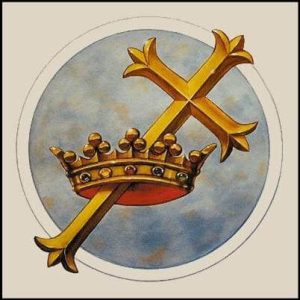
Yet, He endured the cross for the joy set before Him (Heb. 12:2). He saw the crown on the other side of the cross. A crown, not for Him for He already possessed it, but for us. This was not only a crown for the eternal hereafter, but a crown for mankind to experience here on the earth.
Jesus bore the cross that we might bear the crown! However, what was true for Him is true for us. As William Penn wrote, “Christ’s cross is Christ’s way to Christ’s crown.” Jesus taught the necessity of taking up the cross, speaking to the multitudes: “If anyone comes to Me, and does not hate his own father and mother and wife and children and brothers and sisters, yes, and even his own life, he cannot be My disciple. Whoever does not bear his cross and come after Me, cannot be My disciple” (Luke 14:26-27).
No Cross, No Crown
This truth contained in the title of Penn’s book applies to us personally, but also to the nation at large.
True Personally
Jesus taught many times that we are to take up our cross. He declared: “he who does not take his cross and follow after Me is not worthy of Me. He who has found his life shall lose it, and he who has lost his life for My sake shall find it” (Matt. 10:38-39). In Mark 10:21 Jesus told the rich young ruler to “take up the cross, and follow Me.” After Jesus rebuked Peter for trying to divert Him from the cross, He told His disciples they must take up their crosses, deny themselves and follow Him (Matt. 16:21-28; Mark 8:31-38).
Paradoxically, the consequence of losing our life by taking up our cross, is finding life. As we follow Christ’s example of dying to ourselves we will experience the resurrection life of Jesus and the many corresponding blessings of obedience to Him. We receive the crown of life.
True Nationally
In Luke 14:25-33 Jesus instructed the multitudes to take up the cross. This is part of the cost of following Him. He ended His instruction on the cost of being a disciple by saying: “Salt is good; but if salt has become tasteless [lost its savor], with what will it be seasoned? It is useless either for the soil or for the manure pile; it is thrown out. He that has ears to hear, let him hear” (Luke 14:34-35). If we do not take up our cross we will become salt that is tasteless (v. 34). We will not be able to be salt to our society.
Christians that are “cross-less” are “salt-less.” They no longer preserve and season the community and nation. Therefore, no crown will be placed on that people or nation.
America was birthed by Christians who took up their crosses and followed Him. Therefore, we have enjoyed the crown that comes with the cross. American exceptionalism and its many blessings came from obedience to God’s Word.[i] However, as we have laid down the cross and turned from God (whether today or in times past), we have lost the crown and the blessings that accompany it. This has occurred in two ways:
- The blessings of Christianity have diminished as the message of the cross has left a large part of the church in America. The cross is the power of God unto salvation (1 Cor. 1:18). If the message of the cross is not taught in the church, then the church will be salt-less, and there will be no crown.
- The blessings of Christianity have diminished as the life of the cross has left believers. If the life of the cross is not in believers, then they will have a salt-less life and will not be able to bring the crown to society.
To be the salt of the earth we must take up our cross. It is hard to salt our society. Not only does it require thankless work, but it will be met with much opposition, often by those we seek to help. This was true of the early disciples as well as reformers throughout history (such as William Tyndale, the Huguenots, the Pilgrims, the Scottish Covenanters), and it is true for us today (just consider the great opposition to Christians in Muslim nations, and the less-violent assault on Christians seeking to positively influence culture in the United States and various western nations).
The colonists who took up their crosses at the time of the American Revolution (for it was a great sacrifice to perform what they considered to be their duty to God, country, and posterity) were being salt when they spoke against tyranny, fought for independence, and formed a new government. They helped to bring the crown to America – not the British crown, but rather Christ’s crown. The Father of the American Revolution, Samuel Adams, said regarding the signing of the Declaration of Independence: “We have this day restored the Sovereign to Whom alone men ought to be obedient. He reigns in heaven and…from the rising to the setting sun, may His kingdom come.”[ii] The blessings of obedience to the Word of God followed. The Founders of America bore the cross so others could bear the crown.[iii]
What is the Cross? What does it mean to take up your cross?
In the Philippines each year some professing Christians remember and celebrate Christ’s death on the cross by choosing one person to be nailed to a cross. This is a literal crucifixion, though it is not unto death. It is considered an honor to be the chosen person because he is able to identify with Christ’s sufferings. He is paraded down the streets accompanied by many who flog themselves with whips, so they too can identify with the suffering servant. Is this what Jesus meant when he exhorted us to take up our cross? Certainly not.
When I was a young pastor working to start a new church in Atlanta in the early 1980s, my colleague, who had some radical ideas, said one day that he thought God wanted us to make a cross and carry it around the city, stopping at all the major university campuses, preaching and drawing attention to the work of Christ. While doing such a thing was contrary to my personality, I was not about to back down from the challenge, even if I was not sure that God had spoken to him. So we did it. We made a cross about eight feet tall and took a week to walk around the city. This did get a lot of attention, even making it on the local news. And God in His mercy did touch many people’s lives, in spite of our perhaps ignorant zeal.
My action in Atlanta is not really what Jesus meant when He said we are to take up our cross and follow Him. He was not speaking of a physical cross—though many of the early disciples did die by being crucified (that was a cross God called them to bear); and God perhaps called me for that week to make a physical cross and carry it (that was a cross God called me to bear). But such action is not what He calls most believers to do.
Paul, in the book of Galatians, tells us what it means to take up our cross: “Those who belong to Christ have nailed their natural evil desires [the life of nature and of self] to his cross and have crucified them there. If we are living now by the Holy Spirit’s power [filled with the Spirit], let us follow the Holy Spirit’s leading in every part of our lives” (Gal. 5:24-25, Living Bible).
Taking up the cross has two components:
- Nailing our natural evil desires to His cross and crucifying them there.
- Following the Holy Spirit’s leading in every part of our lives.
In Romans 8, Paul affirms that the cross is, 1) putting to death the flesh and 2) being led by the Spirit, doing His will and not our will, when he wrote, “For if you are living according to the flesh, you must die; but if by the Spirit you are putting to death the deeds of the body, you will live. For all who are being led by the Spirit of God, these are sons of God” (Rom. 8:13-14).
As Christians we are constantly challenged to give in to the sinful desires of the flesh. The Bible says we are to crucify these fleshly desires by nailing them to the cross, by recognizing that Christ’s death and resurrection provided a way for us to have victory over such lusts. This is one aspect of what it means to take up our cross daily.
Another aspect of taking up our cross is that we are to follow the leading of the Holy Spirit whatever He may want us to do and wherever He may lead us. We must embrace His plan for our lives. We will generally enjoy His will for our lives, but sometimes walking in His plan is hard. It was not much fun for Jesus to go the way of the cross, yet He said, “Not my will but Thine be done.” Many people have embraced their cross – His will for their lives – with great hardship.
Consider the Apostle Paul, who five times received 39 lashes from the Jews, who was beaten with rods three times, was once stoned, three times shipwrecked, spending a night and a day in the deep, was imprisoned many times and often in danger of death. He says: “I have been on frequent journeys, in dangers from rivers, dangers from robbers, dangers from my countrymen, dangers from the Gentiles, dangers in the city, dangers in the wilderness, dangers on the sea, dangers among false brethren; I have been in labor and hardship, through many sleepless nights, in hunger and thirst, often without food, in cold and exposure. Apart from such external things, there is the daily pressure upon me of concern for all the churches” (2 Cor. 11:23-28).
Foxe’s Book of Martyrs[iv] and By Their Blood[v] are filled with accounts of Christians who have suffered for their faith over the centuries. Fair Sunshine[vi] shows how the Scottish Covenanters gladly embraced God’s will for their lives, bearing their cross even unto death. The history of American colonization is largely the history of Christians who suffered hardship to follow the leading of God. The Founding Fathers readily gave their lives and fortunes to further the cause of liberty.
We have greatly benefited from the sacrifice of the pilgrims, patriots, and pioneers. They gave birth to this great nation and all the liberties we possess. In following God’s will for their lives, they suffered greatly. Yet, they gladly picked up the cross, and because they did we have experienced great blessings. A great price has been paid for our liberty – our crown.
As a multitude before us has done, we must take up our cross and follow Him. Aspects of taking up our crosses will be similar for each of us in that we must all put to death evil desires and the flesh. But we all have different crosses to bear. The path of following His Spirit will be different for each of us. What may be your cross, may not be someone else’s.
Your cross may involve putting to death the fear of sharing your faith, or speaking the truth, or praying. It may also be persevering in raising Godly children, or acting on social and political issues, or doing all that is necessary to fulfill God’s plan for your life and the responsibilities He has given you. The good news is that Christ bears us up as we take up our crosses—He takes up our little crosses into His cross.
William Penn’s Cross and Crown
William Penn is one of many early Americans who bore the cross as he followed the leading of the Holy Spirit in his life. Since he was faithful to bear his cross, he not only received a crown but brought it to the nation at large as well.
[To learn of the life and work of William Penn, see No Cross, No Crown: The Life Message of William Penn]
Bear the Cross and Receive the Crown
If we faithfully bear the cross, the crown will be our possession. This truth exemplified in Penn’s life applies to us in eternity, but also here on earth. Fulfilling God’s will is a delight, but there is a price we must be willing to pay to follow Him and His plan for us. Our sacrifices can have an effect far beyond what we can imagine. Just consider the impact of William Penn or the Pilgrims or the signers of the Declaration of Independence. However, we must remember: No Cross, No Crown.
Satan will offer us a cross-less conquest as he did Jesus.
When Satan tempted Jesus in the desert, he offered Him a kingdom without the crucifixion (Matt. 4:8-9). In response to this offer, Jesus rebuked the devil. Peter tried to talk Jesus out of going to Jerusalem and dying (Matt. 16:21-23). Jesus rebuked him. The people tried to make Him king (John 6:15), in essence offering him a crown without the cross. Jesus withdrew.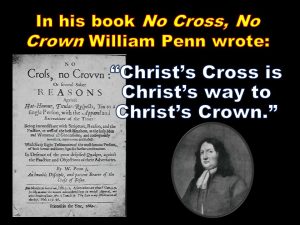
Satan will tell you that you do not have to take up your cross to follow Jesus, you do not have to put to death your flesh, nor follow the leading of the Spirit. People are prone to accept this offer for few are willing to die. People shrink back from pain and seek an easier way. We will avoid anything that brings discomfort. I am thankful that Jesus stayed upon the cross for me and all mankind. He was mocked and tempted to come down:
“You who destroy the temple and rebuild it in three days, save Yourself! If You are the Son of God, come down from the cross” (Matt. 27:40).
“He saved others; He cannot save Himself. He is the King of Israel; let Him now come down from the cross, and we shall believe in Him” (Matt. 27:42).
Jesus could have come down from the cross. He could have popped out the nails, and jumped down from his place of suffering, but he endured for our benefit. He saw the joy on the other side of the cross. Just as “Christ’s cross was Christ’s way to Christ’s crown” so it is for us. Be faithful to bear your cross and He will be faithful to give you a crown, here in this life as well as the eternal hereafter. Bearing our crosses will not only bring us a crown, but it will bring a crown to many others as well.
End Notes
[i] See Stephen McDowell, The Bible: America’s Source of Law and Liberty, Charlottesville: Providence Foundation, 2016, Chapter 1 for more on American exceptionalism.
[ii] Samuel Adams, An Oration Delivered at the State-House, in Philadelphia, to a Very Numerous Audience; on Thursday the 1st of August, 1776; London, reprinted for E. Johnson, No. 4, Ludgate-Hill, 1776. See also Frank Moore, American Eloquence: A Collection of Speeches and Addresses, New York: D. Appleton & Co., 1858, Vol. 1, p. 324. (Some historians do not think Adams made these remarks, but even if this is so, the content is consistent with his beliefs and writings.)
[iii] To learn of some of those blessings see, Stephen McDowell, Monumental: Restoring America as the Land of Liberty, Libertyman Studios, 2013, Chapter 10.
[iv] Foxe’s Book of Martyrs, Edited by Marie Gentert King, Old Tappan, NJ: Fleming H. Revell Company, 1978.
[v] James and Marti Hefley, By Their Blood, Christian Martyrs of the 20th Century, Milford, MI: Mott Media, 1979.
[vi] Jock Purves, Fair Sunshine, Character studies of the Scottish Covenanters, Carlisle, PA: The Banner of Truth Trust, 1990.

